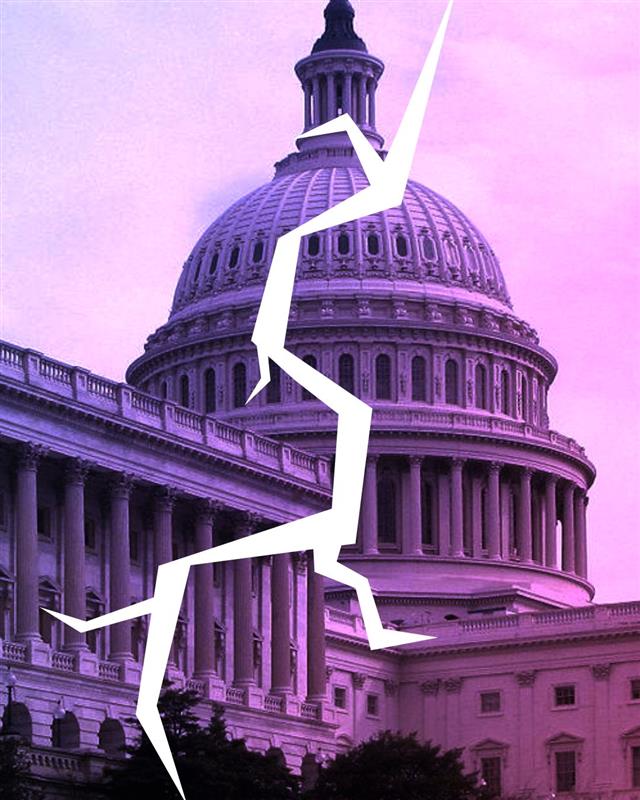As Congress struggles to fund the government, the conversation has shifted toward the national debt—and independent voters should pay attention.
The Big Picture
Congress is once again considering a short-term funding bill to avoid a government shutdown. However, a new wrinkle has emerged: a push by President-elect Donald Trump to eliminate the debt limit altogether. This unexpected demand has ignited debate over government spending, national debt, and fiscal responsibility.
At the heart of the issue is the fact that most of the spending Congress argues about accounts for just 26% of the federal budget, while the remaining 74%—including Social Security, Medicare, and net interest on the debt—is on autopilot. If Washington is serious about addressing deficits and debt, focusing only on discretionary spending won’t cut it.
Zooming In
Congress' Never-Ending Budget Crisis
Congress has repeatedly delayed passing a full-year budget, relying instead on short-term funding bills. The latest effort to avoid a shutdown collapsed when Trump and Elon Musk encouraged Republicans to oppose the deal at the last minute.
- The original 1,500-page funding bill included disaster relief and a one-year extension of the Farm Bill, but it also contained controversial provisions like a cost-of-living adjustment (COLA) for members of Congress.
- In response to backlash, House Speaker Mike Johnson introduced a pared-down, 117-page version—but it still failed after 38 Republicans and 197 Democrats voted against it.
With time running out, Congress must now scramble to prevent a shutdown, revealing once again the dysfunction that plagues Washington.
The Debt Limit Debate: Trump’s Surprise Move
Trump’s last-minute demand to eliminate the debt limit threw another wrench into the funding debate. While some Democrats support the idea, most Republicans have historically opposed it, arguing that the debt limit serves as leverage for spending cuts.
- Trump previously signed three bills suspending the debt limit during his first term (2017, 2018, 2019).
- Fiscal conservatives prefer keeping the debt limit in place, as it was used to negotiate spending cuts in the Budget Control Act (2011) and Fiscal Responsibility Act (2023).
While eliminating the debt limit isn’t politically viable, the conversation has brought mandatory spending—the real driver of deficits and debt—back into focus.
The Growing Federal Debt Crisis
Rep. Don Bacon (R-NE) and Fox News commentator Brit Hume were among those who used the budget fight to highlight the dangers of unchecked government spending. The facts are alarming:
- The federal deficit for FY 2025 is already $622 billion, $242 billion higher than this time last year.
- 74% of federal spending is automatic, with Social Security, Medicare, and net interest on the debt taking up increasing shares of the budget.
- Interest payments on the debt are growing rapidly. In FY 2024, the U.S. spent $949 billion on net interest, more than it spent on Medicare, Medicaid, or national defense.
A Moment of Political Chaos
While watching the funding bill collapse in real time on Capitol Hill, one thing became clear: too few in Congress take their responsibilities seriously.
In the late 1970s, during the economic crisis under Jimmy Carter, Americans questioned whether their best days were behind them. Ronald Reagan answered with a vision of a “shining city on a hill”, restoring optimism and faith in American leadership.
Since then, only Barack Obama has come close to reviving that same hopeful energy. Looking at today’s politicians, it’s hard to see anyone capable of bringing Americans together with a unifying vision for the future.
Data Snapshot
- 74% of federal spending is automatic, while only 26% is discretionary and subject to congressional debates.
- The federal deficit has increased by $242 billion compared to last year.
- Net interest payments ($949 billion in FY 2024) have now surpassed national defense spending.
- The debt held by the public is projected to reach $50.6 trillion by FY 2034.
Independent Lens
Independent voters should be deeply concerned about Washington’s inability to address the country’s fiscal challenges. While Congress fights over a small portion of the budget, the real drivers of debt—Social Security, Medicare, and interest payments—are ignored.
Independent voters value fiscal responsibility and pragmatic solutions, but both major parties continue to play politics instead of tackling these issues head-on. If leaders fail to act, the consequences will be dire—not just for today, but for future generations.
If we want a government that works for the people, we must demand action and accountability from Washington.
Subscribe to our newsletter to stay informed on how independent voters can push for real solutions.




%201.jpg)
